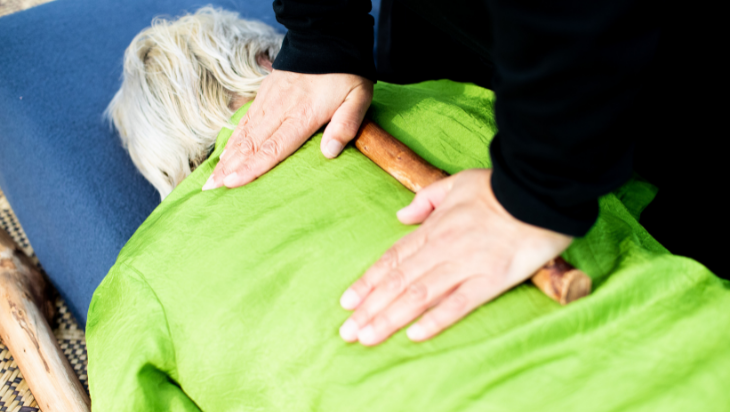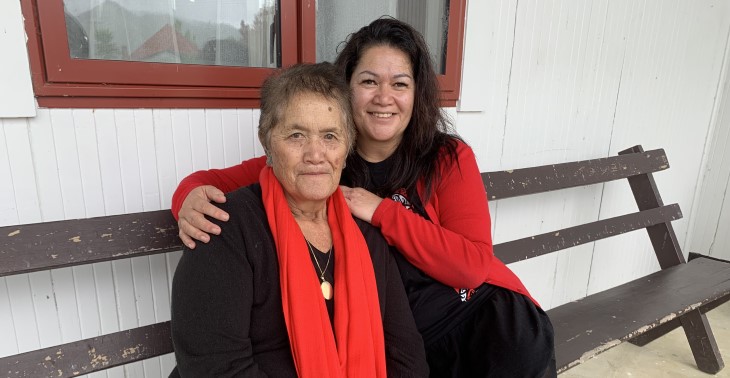Jolie’s story: Maintaining health with rongoā Māori

Rongoā Māori practitioner Jolie Davis is passionate about its power to improve health outcomes for all New Zealanders. Rongoā (traditional healing) has been offered as a rehabilitation service by ACC for three years and is helping a wide range of people.
For Jolie Davis (Ngāti Kuri, Te Rarawa), her passion for rongoā Māori comes from growing up in a community where it was part of her local environment.
“In my community in Ahipara, in the Far North, we had access to rongoā Māori not just for illness or injury, but as a part of maintaining our wellbeing,” says Jolie, founder of Manawa Ora Mirimiri and Workshops.
“I grew up with the understanding that it was normal in terms of hauora (health) and healthcare. It wasn't until I moved away from my tūrangawaewae (place of belonging) that I realised it wasn’t normal to others.”
It was around 15 years ago that Jolie, a trained clinical nurse, left Te Tai Tokerau (Northland) to pursue a career opportunity.
She expected to find a lot of rongoā Māori practitioners in her new location and was surprised when she didn’t. It led to her establishing her own rongoā Māori practice, which is based in Te Whanganui-ā-Tara (Wellington).

Turning to traditional healing
Rongoā is traditional Māori healing comprised of many different techniques, including mirimiri (bodywork), rākau rongoā (native flora herbal preparations), karakia (prayer) and more.
Rongoā Māori has been offered as a rehabilitation service by ACC since June 2020 and the growth in that time has been significant.
As of August 2023, ACC has partnered with more than 160 rongoā practitioners (from Kaitāia to Rakiura) to deliver over 49,000 rongoā sessions for around 6,400 kiritaki (clients).
ACC data shows rongoā Māori claim volumes have more than doubled since the same time last year – there were almost 29,000 rongoā sessions delivered in the 12 months to August 2023.
Over the same period, the number of ACC-registered rongoā practitioners around Aotearoa has increased by 50 per cent.
A holistic approach to health
Jolie believes rongoā Māori has a place in the mainstream health system.
“Alongside ‘mainstream’ healthcare solutions, we’ve got to start providing something more holistic. Something that’s also taking into account the patient’s emotional wellbeing, their relationships with whānau and their stress levels,” she says.
“Connecting patients back to these things will keep them well, happy and whole.”
Jolie believes that disconnection is one of the main causes of disease.
“Especially with Māori, where there has been huge disconnection since colonisation. We have to reconnect back to these practices and belief systems that kept our tīpuna well, happy and healthy.”
Jolie is also a member of the ACC Rongoā Māori Advisory Panel.
It supports ACC to evolve the rongoā Māori service for the benefit of kiritaki (clients) and whānau, and serve as kaitiaki (guardians) to protect rongoā as a taonga (treasure).
The panel uses mātauranga Māori (Māori knowledge) to identify new opportunities that will strengthen access, experience and outcomes for hapori Māori (Māori communities).
The panel also helps ACC to embed te ao Māori approaches by advising on the strengths of a variety of kaupapa Māori initiatives and ideas.

Support of ACC changes the outlook
Jolie says the support from ACC has been a game-changer for the profession.
Around five to 10 years ago, she says rongoā practitioners were struggling. There was a lack of acceptance, people didn’t believe it was a legitimate healthcare option and rongoā practitioners were on the outer.
“We were working out of garages, out of a back room in someone’s house, that kind of struggling, working on koha. The support of ACC has been groundbreaking,” she says.
“For the first time, rongoā practitioners have been able to establish themselves and have that foundation of regular work, referrals and income. It has given us legitimacy.”
A healing option for all
Rongoā Māori sessions are meeting an increasingly wide range of injury needs.
The most common injuries rongoā is used to support are sprains and strains. Around one third of people accessing rongoā care are survivors of sexual violence.
Rongoā is available to clients throughout the motu (country). Waikato is the largest source of claims, followed by Bay of Plenty, Gisborne and Auckland.
And it’s not just for Māori. Non-Māori now account for 40 per cent of all ACC rongoā Māori claims.
Jolie says those who mentored her said, ‘Healing is for everyone’.
“So, they never discriminate. They never saw race. All they saw in front of them was wairua (spirit), a person in pain. Rongoā Māori is not just for Māori, but its whakapapa is to this whenua.”

Manawa Ora whānau (left to right) Rawiri Hirini, Jemma Jeffs, Chrissy Kan, Jolie Davis, Verity Smith and Marty Clamp. Photo: Te Rawhitiroa Bosch (Rawhitiroa Photography)
The impact of personal empowerment
Jolie says everyone should at least try the rongoā system to see if it works for them. The experience is different for everybody, she says.
“We welcome all people to come and access this healing. Why wouldn’t you come to the healing practice of this land, of this whenua? It will help and benefit you, probably more than you realise.”
She says the outcome rongoā practitioners want for patients is personal empowerment.
“We want you to be able to get back in the driver’s seat of your waka, get back in control of your tinana (body) and your hauora. Creating wellbeing and hauora for you and your whānau ultimately benefits the whole community,” she says.
“It's never just about one person. It’s always about connection. It’s about mauri (vitality). It’s about empowering people by acknowledging their mana (authority) and remembering everyone is tapu (sacred).”

More information
For more information please visit the rongoā Māori section of our website.





